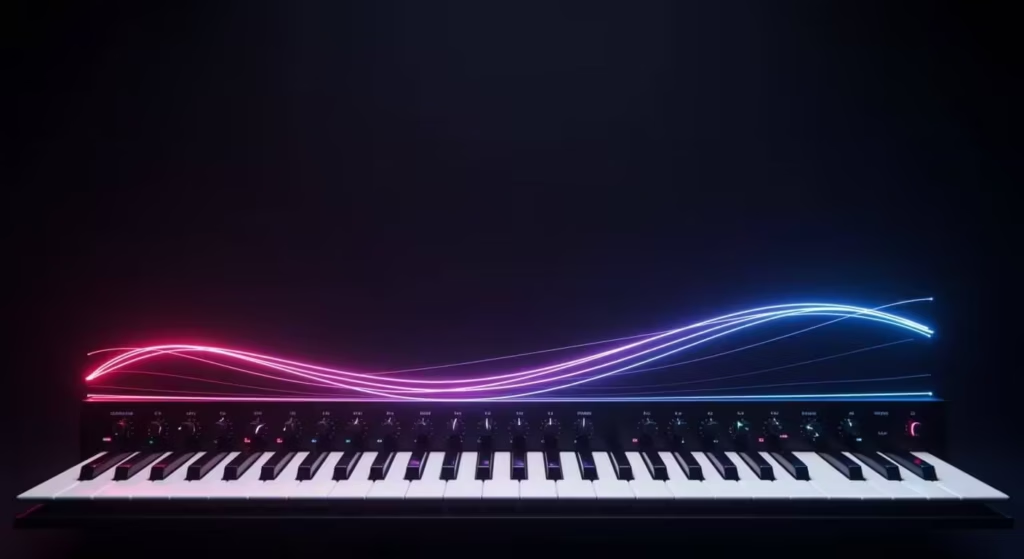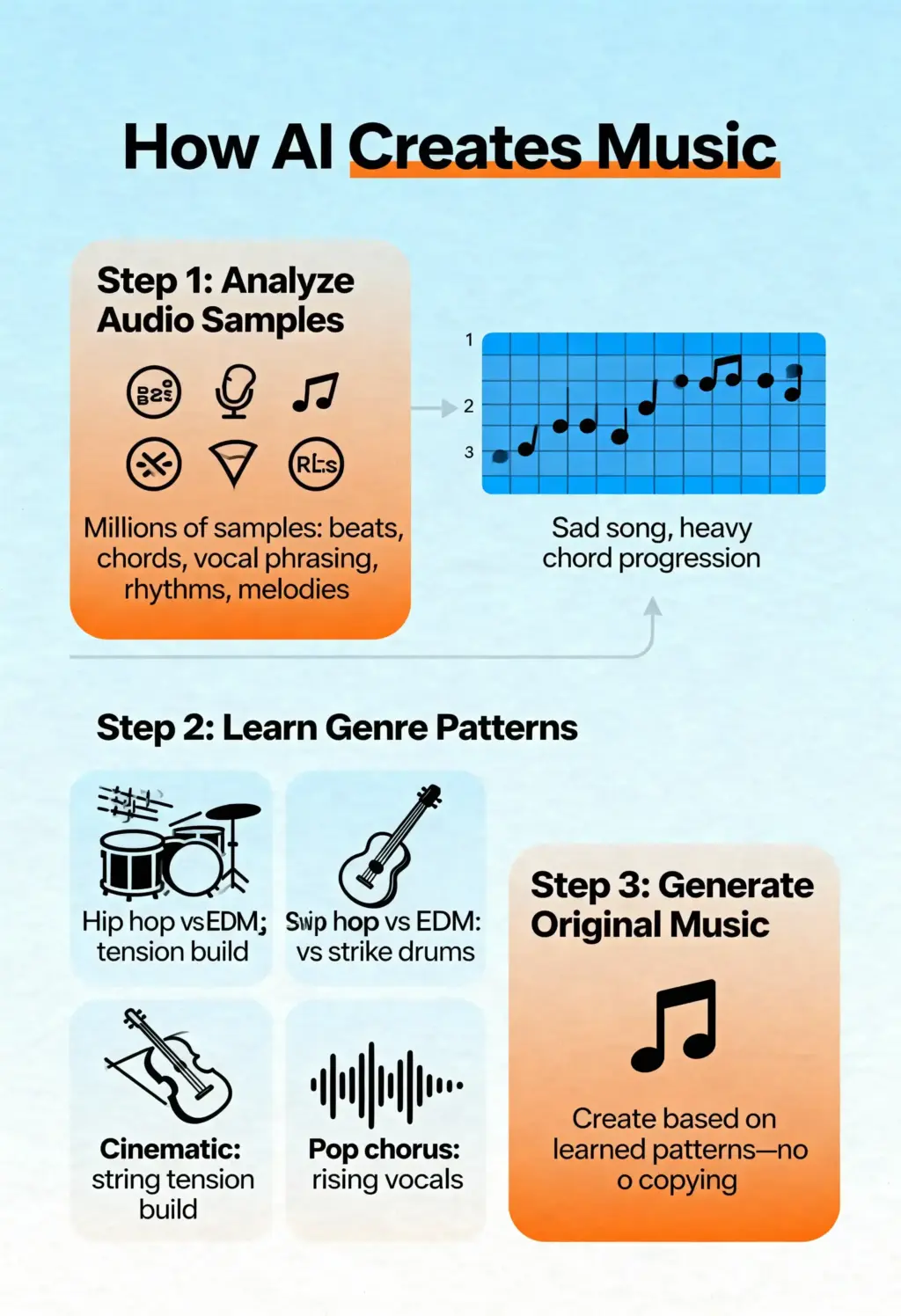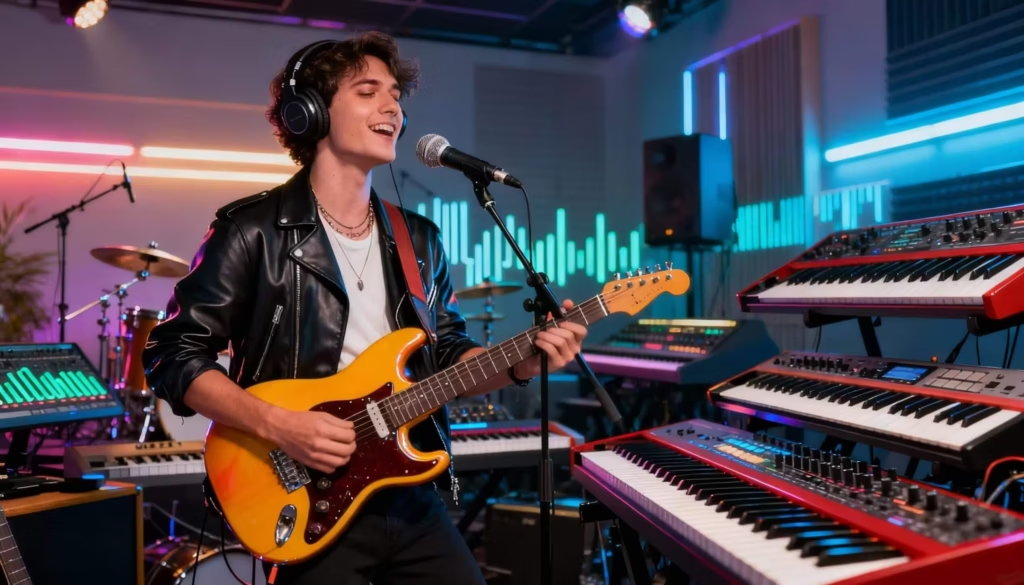AI Music Creators: The New Frontier of Creativity
Eight years ago, the idea of a machine composing full, emotional, structured songs sounded like science fiction. Back then, AI could barely string together a basic melody—let alone generate full arrangements, meaningful chord progressions, or genre-consistent tracks.
Today?
AI music creators are no longer experimental toys. They’ve become powerful creative companions used by producers, content creators, filmmakers, indie artists, and even everyday hobbyists who want to create sound without spending years learning music theory.
Having worked with AI and music technology for nearly a decade, I’ve witnessed this transformation from the inside—testing prototypes, collaborating with music technologists, and watching platforms like Melodycraft.AI redefine what “computer-assisted creativity” can truly achieve.

What follows is a complete, experience-based review of the new world of AI music creators—how they work, why they matter, who benefits most, and how they’re shaping the future of music.
How AI Music Creation Works

One question people always ask:
“But how does the AI actually make the music?”
The simple version is this:
AI music creator tools analyse millions of audio samples—beats, chords, vocal phrasing, rhythms, melodies—then learn the patterns that define each genre.
This includes things like:
- How a chord progression makes a sad song feel heavy
- How drums swing in hip hop vs. how they strike in EDM
- How string sections build tension in cinematic soundtracks
- How pop vocals rise in the chorus
- how instruments blend together to form a “style.”
AI learns these rules and uses them to generate original music—never copying, only creating based on patterns.
In my years working with platforms like Melodycraft.AI, the biggest jump came when the AI began understanding mood and emotional contour. For example, saying:
Create a warm, nostalgic piano melody with soft pads and light drums.
, now results in music that actually feels warm, nostalgic, and emotionally coherent.
This emotional awareness is what separates older AI tools from the new generation.
My First Real Encounter With AI Music
In 2017, I tested my first serious AI composer. I typed a simple prompt:
“Ambient electronic with slow tempo.”
The result wasn’t perfect—but it was surprisingly musical. That moment felt like watching the first spark of a revolution.
But when 2020–2021 arrived, the real shift happened.
AI tools have suddenly produced:
- cleaner melodies
- realistic chords
- genre-accurate drum patterns
- evolving emotional structure
- and vocals that didn’t sound like robots choking on WiFi
By 2023–2026, tools such as Melodycraft.AI pushed the field forward. Their ability to create:
- multi-layer arrangements,
- full stems,
- genre-flexible soundtracks, and
- emotionally-driven phrasing
…turned AI from “good for inspiration” to “legitimately useful for production.”
Today, AI-generated music is often indistinguishable from human-composed tracks unless you have a producer-level ear.
What Makes Modern AI Music Creators So Powerful?

After years of hands-on experience, I’ve narrowed down the key features that make today’s AI tools truly game-changing.
1. Deep Genre Intelligence
Older AI tools produced generic, flat songs.
Modern engines understand genres the way a trained musician would.
Ask for:
- lo-fi hip hop
- orchestral hybrid
- trap
- OPM acoustic
- synthwave
- Bossa nova
- hard techno
…and the AI generates music following the correct patterns of that style—drum swing, instrument choice, harmonic rhythm, timbre, and energy.
Melodycraft.AI, for example, excels at genre consistency. If you ask for a nostalgic 90s R&B sound, it accurately reproduces its chord language, drum textures, and melodic phrasing.
2. Customization Instead of Randomness
You can now control:
- BPM
- mood (sad, hopeful, dramatic, chill)
- structure (intro, verse, chorus)
- instruments
- energy levels
- layers
- variations of specific sections
This turns AI from a random generator into a genuine composer’s assistant.
3. Exporting Useful Production Files
Back then, AI only gave you an MP3.
Today, platforms like Melodycraft.AI offer:
- STEMS
- MIDI files
- layered instruments
- editable sequences
- separate drums, bass, vocals, and chords
This allows producers like me to plug AI output into a DAW (Logic Pro, FL Studio, Ableton), edit it, re-record parts, add effects, and shape the final track with human artistry.
This is the biggest workflow improvement of my entire career.
4. AI Vocals & Lyric Writing Have Become Shockingly Good
AI voices today can:
- sing on pitch
- express emotion
- adjust timbre (soft, airy, deep, gritty)
- match different languages
- generate harmonies
- follow rhythmic phrasing
Lyric generation also matured. It’s no longer robotic, but concept-driven, tone-appropriate, and structured into verses, hooks, and bridges.
Though I still refine lyrics manually, AI gives me an instant starting point instead of staring at a blank page.
5. Adaptive Learning
The more you use AI tools, the more they begin to reflect your creative preferences.
They learn:
- your favourite chord styles
- how you structure songs
- the genres you lean toward
- the moods you prefer
- the rhythms you use most
It’s like having a co-producer who slowly understands your artistic identity.
Will AI Replace Musicians? The Honest Truth After 8 Years
Short answer:
No. Not even close.
Long answer:
AI will replace mechanical tasks, not the heart of artistry.
AI is amazing at:
- fast inspiration
- generating arrangements
- drafting soundtracks
- helping non-musicians create
- assisting professionals during idea blocks
But AI cannot replace:
- lived human experience
- emotional authenticity
- personal stories
- unique artistic identity
- cultural nuance
- intentional imperfection
AI can write a sad song.
But it cannot understand why your sadness feels different from mine.
That’s the biggest difference—and the biggest reason humans will always remain central to music.
Who Gains the Most From AI Music Tools?
Based on real-world usage, here’s who benefits the most.
1. Content Creators
YouTubers, TikTok creators, vloggers, and marketers need fast, copyright-safe music.
AI solves:
- delays
- licensing issues
- cost
- consistency
Melodycraft.AI is becoming a favourite among short-form creators for reliable background tracks with fast turnaround.
2. Indie Musicians
Indie artists often lack access to expensive studios or full teams.
AI helps them:
- produce demos
- build beats
- experiment with styles
- sketch melody ideas
- test arrangements
- write lyrics
It gives them a “mini studio partner” at zero additional cost.
3. Filmmakers & Game Developers
Instead of waiting weeks for custom scoring:
- create dozens of soundtrack variations
- match emotion for each scene
- adjust pacing
- change instruments
- create loops for gameplay
I’ve seen indie game devs use AI music to sound like AAA-level productions.
4. Brands & Businesses
Corporate videos, ads, product promos—all now need original music due to copyright tightening.
AI allows them to create high-quality, legal, instantly licensed tracks.
5. Beginners and Hobbyists
People who’ve never touched music theory can now create songs within minutes.
This democratization is amazing because it welcomes more people into music creation.
8 Major Observations After Years of Using AI Music Tools
- Inspiration is instant—you never start from zero.
- AI reduces the technical barrier, letting creativity come first.
- It encourages cross-genre experimentation no human would think of.
- It speeds up the workflow 10x for producers.
- Artists become more versatile with AI assistance.
- Songwriters get melody and chord ideas quickly.
- Deadlines are easier to meet—especially for filmmakers.
- AI boosts creativity instead of replacing it.
Are AI-Generated Songs Original?
Yes.
AI does not copy copyrighted material. It learns patterns and creates new compositions.
The resulting music—whether generated through Melodycraft.AI or other platforms—is considered original and safe for commercial use.
Limitations
Even as someone who loves AI tools, I must be honest about their limits.
1. Emotional authenticity is still not at 100%
Humans inject nuance AI cannot replicate yet.
2. Long complex songs can confuse the system
Especially jazz fusion, progressive rock, or film scores over 15 minutes.
3. Lyrics sometimes need rewriting
AI struggles with metaphor, cultural nuance, and unique storytelling.
4. Niche cultural genres may sound inaccurate
Anything requiring deep cultural context is still best guided by human musicians.
5. Human mixing & mastering remains essential
AI gives you the idea, but a human finishes it.
The Future of AI Music Creation (My Predictions)
Based on how fast AI has evolved, here’s where I believe the industry is heading.
1. Fully Personalized AI Models
Imagine training your own AI composer based solely on your discography or style.
Platforms like Melodycraft.AI are already moving in this direction.
2. Real-Time AI Co-Performers
AI improvising during live concerts—like having a virtual band member who reacts on the spot.
3. Hyper-realistic AI vocals
Voices with human breath, emotion, grit, imperfections, and personality.
4. “Music for Everyone” Reality
Just like everyone takes photos today—even without photography training—everyone will be able to create music effortlessly.
5. Integration Into Every Studio Workflow
Within a few years, AI music generation will be as normal as using:
- autotune
- drum machines
- synthesizers
- DAWs
AI is not a trend.
It’s the next major evolution in music.
My Honest Review of AI Music Creators
After 8 years in this field, I can confidently say:
AI music creators are the biggest technological leap in music since digital audio workstations.
They empower:
- professionals
- beginners
- brands
- filmmakers
- content creators
- hobbyists
And platforms like Melodycraft.AI are leading the charge toward accessible, flexible, emotionally-aware music generation.
- AI does not replace musicians.
- It enhances them.
- It opens creativity rather than closing it.
- It speeds up inspiration instead of stealing originality.
The artists who embrace AI will create more, explore more, and grow faster than ever.
Those who resist will be left behind—just as photographers who refused digital cameras were.
The future of music is not human vs AI—it’s human + AI, working together.